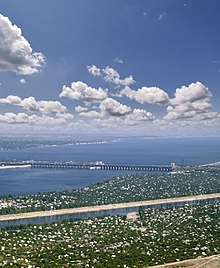Volga Hydroelectric Station
| Volga Hydroelectric Power Station | |
|---|---|
 |
|
| Official name | Волжская ГЭС |
| Location | Volga, Russia |
| Coordinates | 48°49′34″N 44°40′19″E / 48.82611°N 44.67194°ECoordinates: 48°49′34″N 44°40′19″E / 48.82611°N 44.67194°E |
| Construction began | 6 August 1950 |
| Opening date | 10 September 1961 |
| Operator(s) | RusHydro |
| Dam and spillways | |
| Impounds | Volga River |
| Height | 44 m (144 ft) |
| Length | 725 m (2,379 ft) |
| Reservoir | |
| Creates | Volgograd Reservoir |
| Total capacity | 31.5 km3 (8 cu mi) |
| Surface area | 3,117 km2 (1,203 sq mi) |
| Power station | |
| Turbines | 9 × 115.0 MW 8 × 125.5 MW 5 × 120.0 MW 1 × 11.0 MW |
| Installed capacity | 2,650 MW 2,744 MW (max) |
| Annual generation | 10,999 GWh(2015) |
| Static inverter of HVDC Volgograd-Donbass on dam | |
The Volga Hydroelectric Station or Volga GES (Russian: Волжская ГЭС) also known as the 22nd Congress of the CPSU Stalingrad/Volgograd Hydroelectric Power Station (Russian: Сталинградская/Волгоградская ГЭС имени XXII съезда КПСС), is the largest hydroelectric station in Europe and is the last of the Volga-Kama Cascade of dams, before the Volga River flows into the Caspian Sea. Today, it is operated by the electricity company RusHydro.
Built as part of a massive post-war industrialization effort known as the Great Construction Projects of Communism, it was authorized by Joseph Stalin signing the Council of Ministers of the USSR order #3555 on 6 August 1950. The plan called for building a station north of the city of Stalingrad (modern Volgograd) with a minimum storage capacity of 1.7 million KWh.
Ten thousand youths from the Komsomol league participated in the construction, and the city of Volzhsky was formed on the left bank of the river to provide housing. Machinery was sent from all corners of the country; Moscow, Tashkent, Chelyabinsk and Kharkov, and forestry from Karelia. New electric equipment came from Zaporozhye and Sverdlovsk. The turbines and generators were built in Leningrad. In total more than 1,500 individual plants and dozens of research institutes sent equipment and specialists.
...
Wikipedia
